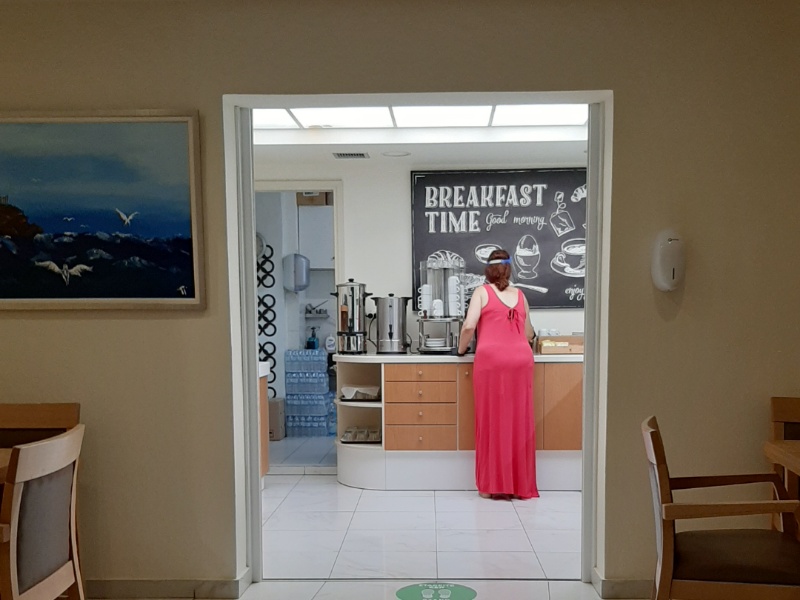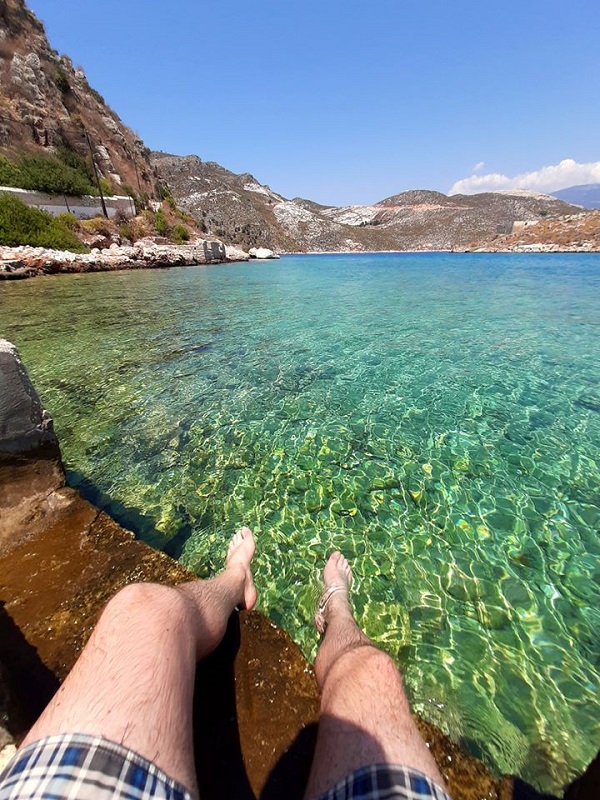Corona Holiday in Greece: Pretty Much Like Normal Life
As I’m nearing the end of my summer holiday in Greece I would like to take the opportunity to answer a question which I got asked a number of times: How is taking a Greek vacation in the era of the corona virus like? The short answer: Pretty much the same like normal!
Greek summer
Having travelled for around two weeks to multiple destinations in Greece, I can pretty much conclude that Greece has aced its corona virus (COVID-19) handling.
Although smart measures have been taken to ensure the safety of tourists, these hardly affect your holiday at all. My entire stay felt like any other Greek holiday I’ve taken before.
In this post I will address three aspects of travelling to Greece in the era of the corona virus. Which measures can you expect during your stay? How does life look like in Greece? And finally, what is the impact of COVID-19 on tourism in this popular tourist destination?
Corona measures
The Greek Government has outlined several corona measures to which both tourists as well as businesses are required to follow. For tourists, this begins with filling in a passenger locator form (PLF) at least a day before they fly or take a ferry to Greece.
If you plan on travelling to Greece overland through one of the Balkan countries you however require a negative corona test issued no later than 72 hours before crossing the border.

Data collection
On arrival at the airport, you may be selected for sample corona testing. According to reliable sources, this is the case if your PLF code starts with the number 1, while people with a code starting with a 2 can proceed directly to passport control and baggage reclaim.
The reason behind this random sampling is that it allows the Greek health authorities to gather solid data what the infection rates are of arriving tourists. Although obviously some people infected with the corona virus have been found this way, the numbers are seen as entirely manageable and according to expectations.
Only the corona infection rate among Balkan tourists crossing the land border was deemed too high, which is why Greece has now come up with the requirement of a negative corona test there.
Masks
In Greece there is a requirement to wear a face mask in public transport, airports as well as on board of all Greek airlines. You are also required to wear a mask on board a ferry, although you can take it off once on the open deck or in your cabin.
People working in the tourist industry have to wear face masks as well, something which I thought was strictly enforced at every accommodation I’ve stayed in. Encouragingly, I could not spot a difference between large hotels and small-time pensions.
As a guest, you do not have to wear a mask – this is completely optional.

Hotels
At one small guesthouse, the owner explained me that all people working in the tourist industry received clear guidelines when it comes to contact with tourists as well as cleaning standards.
You will see for example that a hotel employee picking you up from the airport or port will wear a mask at all time. The same counts for the check-in and cleaning staff.
Hand sanitiser is also made available in rooms as well as at other key hotel points (eg. reception or elevator) so you can clean your hands properly.
Breakfast has been changed as well as the classical buffet is no longer allowed in the age of corona. Instead, most hotels where normally a buffet is offered will have an employee plating your choice of breakfast so that only one pair of hands touch all the food and utensils.
One owner of a small hotel told me that check-out time has been put an hour earlier, as only this way he could ensure full disinfection and cleanliness of all studios according to the new, higher standards imposed by the government.

Life in Greece
There are also some measures visible in shops, cafes and restaurants. Some shops have a maximum amount of people allowed inside at one time – which is especially the case in smaller, badly ventilated buildings.
I found this again pretty well adhered to. For example, at one small island bakery locals waited patiently outside, while inside a tourist shop the employees made sure that only two persons browsed through the small store at the same time.
At most cafes and restaurants – especially those which have indoor seating as well – staff will not only wear a mask but also a face shield.
Fortunately, you will not notice much of this though as Greek summer life plays out outdoors. If you sit outside for a coffee or go for a meal at a local taverna, you will hardly notice the difference with normal life. At exclusively outdoor taverns on the smaller islands, staff will most often opt not to wear a mask at all.
When sitting in such a tavern on a village square or besides the sea, it all just felt like any other holiday to Greece I’ve taken before! When it comes to sightseeing, hiking, sunbathing or swimming there are also no changes whatsoever.

Crowds
One aspect which definitely has changed are the tourist numbers. If you are used to taking a holiday in high season you will be shocked just how empty Greece is.
Given that I normally avoid high season travel to major holiday destinations like Greece because I dislike crowds, I absolutely loved this aspect.
Expect cities, major sights and even beaches to be completely empty during daytime. In the evening people do still congregate by strolling the main streets of town, which at least ensures a lively enough vibe in the taverns.
That said, only the popular taverns among locals seem to still attract some crowds. It is not uncommon for tourist restaurants and shops to remain eerily empty.

Tourist numbers
Most hotel owners I spoke to estimated that in July occupancy is around 10 to 15 percent of a normal July month. Although they said that in August this was up to 25%, the numbers are still shockingly low compared to normal times.
These numbers are more or less the same across all islands, from more popular islands like Rhodes and Naxos to lesser known places such as Chalki and Kastellorizo which I’ve all visited on my trip.
That said, some islands feel the impact of the corona virus much more than others. Take for example the island of Astypalaia which I visited. Even in normal times, Greek tourists make up between 80 and 90 percent of all visitors according to local hoteliers and restaurant owners.
Although of course also domestic tourism is in a sharp decline as lots of Greeks decided not to take a holiday amidst financial or health worries, at least some of the season seems to be saved here even though the same 10 to 15 percent occupancy applies.
The same cannot be said for an island like Rhodes, which is so dependent on key holiday markets like the UK. Although Brits are now slowly flown in again, the tourist resorts are eerily empty and many restaurants and pubs in Rhodes Town have days without getting a single customer. Especially here I could see the desperation in the eyes of some local restaurant and pub owners.
Interestingly, there seemed to be a difference in how the locals view the arrival of thousands of tourists to their country.
While for those employed in tourism the arrival of foreign visitors is a sheer necessity, some locals employed in other businesses still fear about the public health consequences and avoid close contact. This for example included some of my own Athens friends who (perhaps smartly) adhered to the prescribed one-and-a-half metre physical distance.

Visit Greece
If you do feel secure enough to take a holiday in this difficult summer I can highly recommend anyone to visit Greece. Corona measures are sensibly applied, yet they do not interfere with daily life creating a sense of normalcy.
You can have some bargain flight and hotel deals if you decide to visit Greece this summer. In some island taverns I was even offered wine and beer on the house if I would just sit down and have a meal – which one local restaurant owner admitted was a move out of desperation given the low tourist numbers.
As the Greek economy is so dependent on tourism, and many people working in tourism are dependent on these summer months to get their yearly income, an increase in tourist numbers is actually vital for their livelihood.
By visiting Greece you will not only tremendously help the economy, but will also have the once-in-a-lifetime opportunity to experience how summers are like without mass tourism. Grab the chance, if you can!

